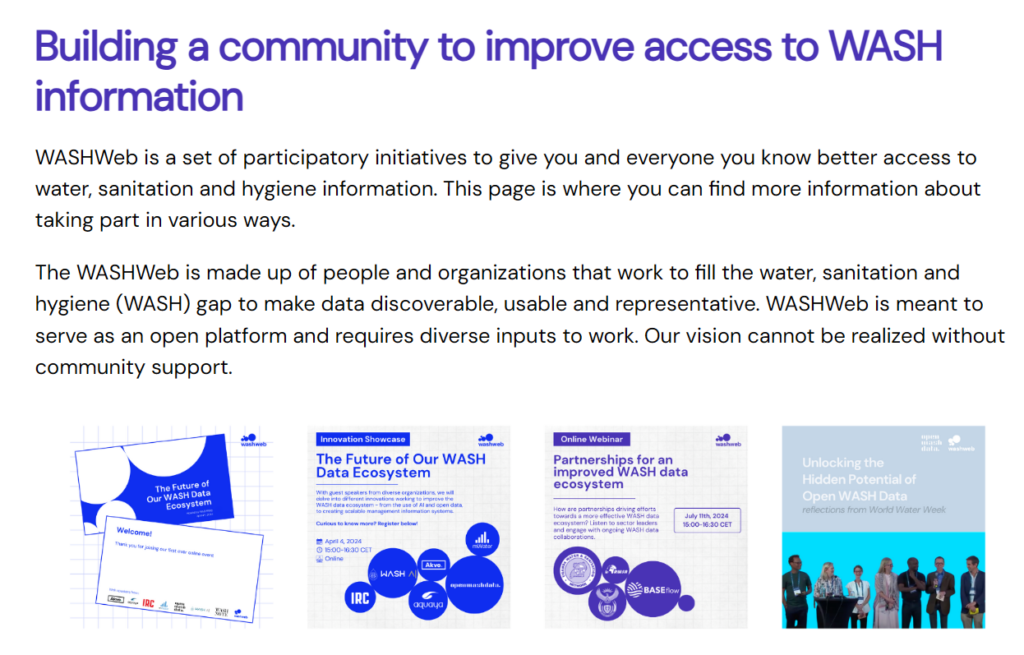So much has changed but we’ve remained busy as the year passed quickly! Here’s a quick taste.
Community exchanges and knowledge sharing has been a focus throughout. We’ve supported several events on WASH data and innovation, knowledge graphs, AI in vulnerable settings and more:
- Organizing and supporting webinars on improving the WASH data ecosystem with WASHWeb and openwashdata
- Sharing the use of knowledge graphs for evaluation with the MERTech community
- Participating on a panel on AI in WASH in vulnerable settings organized by IWMI
- Preparing and hosting a discussion on “AI and Trust: Who Holds Responsibility?” for Data Science Rotterdam
We continue to support the use of evidence and data to drive forward a research and learning agenda connected to policy and practice:
- Supporting WHO with the the WASH Accounts Production Tool development
- Supporting and consolidating lessons on the Sector-Wide Sustainability Checks
- Scoping the potential use of AI and potential strategic responses to an increasingly AI-driven information economy for the global monitoring of water and sanitation SDGs
- Simulating cold winters and different interventions starting with 5 minute data from 300 households in the Netherlands with Wattopia to answer questions around the ‘net congestion’ issue raised by Dutch grid operators.
WASHWeb

On the community front, in 2024 and 2025 WASHNote has supported the WASHWeb webinars with partners including live at Stockholm in 2024. We have done this in partnership with all the organizations taking part and presenting including generous support from openwashdata.org from Global Health Engineering in Zurich.
Are you interested in hosting the next one? Get in touch!
- Unlocking the hidden potential of open WASH data (online and live at Stockholm World Water Week) (August 2024)
- Partnerships for WASH Data (July 2024)
- The Future of Our WASH Data Ecosystem (April 2024)
- A dialogue on reinventing water and sanitation data (March 2025)
WHO GLAAS WASH Accounts
For the WHO GLAAS WASH Accounts, we’ve continued to support the testing and specification development of the WASH Accounts Production Tool which is used by country teams to gather all expenditure across the country from all actors: households, service providers, government authorities, banks, NGOs, donors, etc. This has also included setting up a testing protocol to ensure that the tool continues to produce correct outputs across different versions.
Sector-Wide Sustainability Checks
As an IRCWASH Associate, Nicolas Dickinson, supported the start of Sector-Wide Sustainability Check exercises in Puntland Somalia and in Sierra Leone in partnership with the governments there and UNICEF in country. This built on experiences working in Mauritania and the facilitation of a regional knowledge exchange across different countries to distill lessons learned.
Building on those experiences, we prepared a distilled and simplified guidance, set of activities, and list of indicators that can be quickly adopted. We start first by asking up front what the concerns and priority questions of sector actors are and go from there. This approach focuses the search for existing data and information sources, the collection of new data if possible, and supports meaningful analysis from the very beginning.
Energy in the built environment
Using 5-minute heat pump and smart meter sensor data for some 300 households, as part of the Wattopia team led by Marten Witkamp, Nicolas Dickinson helped to organize data and model the impact of heat pumps on the electrical grid in the Netherlands. He lead the development with Petra Izeboud of the python libraries which were published: https://stroomversnelling.github.io/
The team used the data and metadata of each household to build a performance profile for how the heat pump would operate in different temperatures. Using weather data from historical cold winters, we then simulated cold winters to identify the potential impact of electrical heating using heat pumps on the power grid. In addition, we were also able to test different scenarios, such as heating the water used for heating in off-peak hours only.
Noteable mentions
- WHO GLAAS Dataset R package and archive: https://openwashdata.github.io/glaas/ (peer review/guidance)
- Linked Open Data Hackathon 2024 and 2025: Nicolas Dickinson participated as a team member/participant in the Dutch Heritage Hackathons to use different Linked Open Data datasets and produce a product for which users can explore the content without knowing the data behind it. He produced interfaces including georeferenced maps, images, music, and interactive animations based on linked open data and public domain and CC content.
